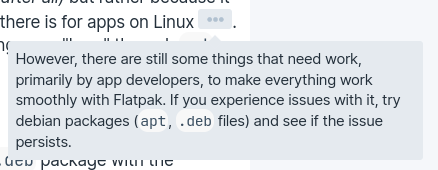I don't think you quite get what I wanted to say, so let me paraphrase.
Instead of just endlessly sticking to the exact same way of doing things for years on end, and just making anyone which picks up the OS use it that way and only that way, we should be able to adapt to not only the time, but also to the user in front of the screen.
By offering and encouraging tools out-of-the-box that give more control[1] over the software they run to users we not only fill an expectation that many users especially of the coming generation have, but also give the user the ability to decide how their software runs. This isn't only about the packaging format, or whether maintains are willing to step up to make their software work, this is about a larger paradigm-shift in the Linux Desktop landscape.
→ Developers want something that they can target, that is consistent across distributions, and which gives them control over how they ship their apps to users.
→ Users want something that works everywhere no matter which Linux OS they install, that they have control over, and that isn't tied to the system[2].
Flatpak and related tech accomplishes basically all of the above, and it provides extra APIs that developers should make use of, like Portals[3], to ensure they're handling their user's data with care.
